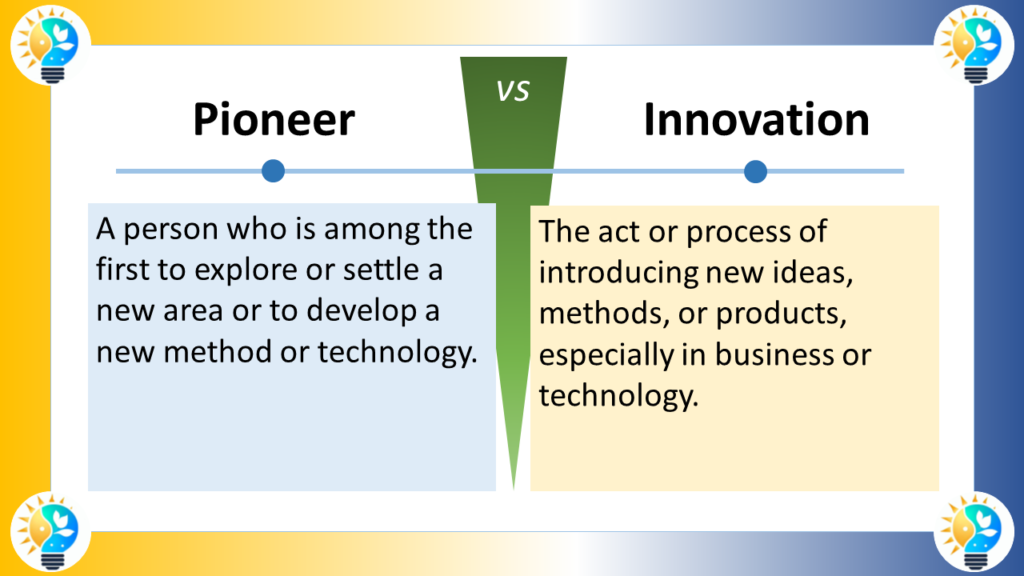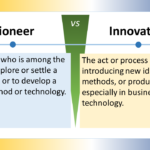The difference between innovation and pioneer lies in the distinction between a concept and an actor.
Innovation refers to the act or process of introducing new ideas, products, or methods.
A pioneer is an individual, group, or company that is among the first to explore, create, or apply these new ideas, often leading the way in a particular field or industry.

Definition
Innovation
Innovation is the introduction of new and improved ways of doing things, which could be manifested in technological advancements, novel products, or more efficient processes.
- Characteristics of Innovation:
- Novelty: Involves fresh thinking and new ideas.
- Implementation: Not just the idea, but also the practical application matters.
- Improvement: Aims to bring about better solutions or outcomes.
Pioneer
Pioneer refers to someone who initiates or helps in the creation or development of new ideas, practices, or territories.
- Characteristics of Pioneer:
- First Mover: Among the first to establish a presence in a new area or field.
- Trailblazer: Opens up new avenues for others to follow.
- Risk-Taker: Often ventures into uncharted territory with uncertain outcomes.
More Synonyms on innovation, innovate and innovative
Innovation Terms

Innovation is considered as a driving force in progress.
It includes the introduction of novel ideas, methods, or products that bring positive change and advancement.
For more information about innovations, check our glossary
Relationship and Relevance
Pioneers are often associated with innovation because they are the ones to forge ahead with the new ideas that define what it means to innovate. Pioneers lay the groundwork for future developments, while innovation is the broader process that may continue well beyond the initial pioneering efforts.
Innovation
- Innovation is the broad process of creating something new that provides value, whether it is a new product, service, business model, or process.
- Innovation can range from incremental improvements to existing offerings to more radical, disruptive changes.
Pioneer
- A pioneer is typically associated with being among the first in a particular field or area of exploration.
- Pioneers innovate by exploring uncharted territories of new concepts, often with a technology-driven focus.
- Pioneers work on "crazy ideas" that may lead to future disruptions, while fast followers leverage those pioneering technologies to quickly develop viable innovations.
- Pioneers are good at open innovation, integrating internal and external teams to create new ideas. They have a robust approach to scaling up innovations.
In summary, while both innovation and pioneering involve creating something new, the key difference is that pioneers are the first movers who explore uncharted territories and lay the groundwork for future innovations. Innovators, on the other hand, can range from incremental improvers to disruptors, but they build upon the work of pioneers to create new value. Pioneers take on higher risk, while innovators leverage the work of pioneers to develop viable solutions more quickly.
Context for Using Each Term
- Innovation is used in contexts that involve the creation or adoption of new ideas, methods, or products that improve upon the status quo.
- Pioneer is used to describe individuals or entities that lead the way in new fields of research, markets, technologies, or geographical regions.
Example of Utilization
A company that develops a new type of battery with much higher energy density than currently available options is engaging in innovation. The Wright brothers, who were the first to achieve powered, sustained, and controlled airplane flight, are classic examples of pioneers in aviation.
In summary, innovation encompasses the broader phenomenon of introducing new solutions or methods, while a pioneer specifically refers to an entity or individual that blazes a trail in a new or developing field, often laying the foundation for future innovations.
- . Invention vs. Innovation: Understanding the Difference
- What's the difference between "pioneer" and "innovator"?
- About Innovation: Pioneers, Fast Followers, and Defenders
- Pioneer vs. Innovator - What's the difference?
FAQ
Q1: Can an individual or company be both an innovator and a pioneer?
A1: Yes, many successful individuals and companies are both innovators and pioneers, creating new products or methods while also being first in their field.
Q2: Is pioneering always innovative?
A2: While pioneering often involves innovation, it's possible to be a pioneer without introducing entirely new innovations, such as being the first to apply existing methods in a new context.
Q3: How do businesses balance innovation and pioneering?
A3: Successful businesses often strive to innovate continuously while also looking for opportunities to pioneer new markets or technologies when strategic.
Q4: Is pioneering more risky than innovation?
A4: Generally, pioneering is considered more risky as it involves venturing into unknown territories, while innovation can occur within established frameworks.
Q5: Can you innovate without being a pioneer?
A5: Absolutely. Many innovations occur within existing fields or markets, improving upon what already exists without necessarily being the first in a new area.

